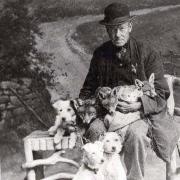Pat Ashworth meets the chairman of the Derbyshire Young Farmers Club, recipients of a Prince’s Countryside Fund grant
The earth is saturated after the winter rain and our boots slurp and squelch in farmyard and pasture. The horizon above Middleton is an uncertain grey. But the sheep don’t seem to mind, the cattle are munching mounds of home produced, sweet-smelling silage in the cowshed and if the activity and passion of the Derbyshire Federation of Young Farmers Clubs (YFC) are anything to go by, the future of farming in this county looks pretty safe.
This is the ancient Smerrill Grange Farm, near Bakewell, home of the YFC’s county chairman, Helen Yates. She grew up here with her parents and brother and feels happy and privileged to have done so, not just for the freedom of the countryside but for the experience of life and death from a very young age. ‘We see the hard work, we see things born and we see things die,’ she observes. ‘You get a very grounded perspective on life, down to earth and hardworking. I think it makes a certain character of you. I think I’m quite driven to get on with it.’
You’d have to be driven to do what she does, which is combining a full-time day job as a commercial property manager with the considerable demands of an organisation with 450 members in the 10 clubs of Bakewell, Hope Valley and Buxton; Belper, Ashbourne, Smalley and Derby; Pleasley, Barlow and Ashover. The array of activities and inter-club and national competitions on offer for an age range that spans 10-26 is breathtaking, from sports to drama, entertainment, public speaking, debating and crafts.
‘It’s absolutely brilliant,’ Helen says with enthusiasm. ‘You get an opportunity to do things you wouldn’t normally do. I’ve played ladies hockey in the pouring rain and a panto fairy on stage in front of a large crowd... We went national in the dancing, frisbee and cheerleading competitions last year... And the ready-made social life is brilliant too, with the annual pilgrimage to Blackpool or Torquay, when Young Farmers from all over the country gather for the finals of all these competitions, and there are massive parties. Any excuse for a party.’
There’s charity work as well, with thousands raised for, among others, Ashgate Hospice and the Air Ambulances. And yes, it’s definitely a bit of a dating agency. But there’s a serious and intentional side to the YFCs too, of course, evident in stock judging competitions, handling all-terrain vehicles (ATVs), learning first aid and getting to grips with agricultural tasks such as fencing. The previous night had seen the first meeting of a Derbyshire YFC branch of ARAC (Agricultural and Rural Affairs Committee), a forum for expressing industry concerns with bodies such as the National Farmers Union (NFU), the grant-making trusts, the agricultural colleges and the rural communities in general.
‘We are the future of the industry, people do listen to us and we want to have our voice on things that affect the farming industry,’ Helen says with conviction, also emphasising the priority she wants to give this year to the YFC Youth Forum for the under-18s. Not all YFC members are farmers or living on farms and nor do they have to be: the organisation is open to anyone of membership age in the rural communities. But when grants were being made available by the Prince’s Countryside Fund (PCF), the response of members to Derbyshire YFC’s questionnaire seeking to identify what would be most useful for them highlighted training, especially safety training.
‘It’s a dangerous job. Someone is killed on a farm almost every week,’ Helen says soberly. ‘It’s handling stock where you’re doing something like TB testing; using dangerous equipment; working often in isolation; being around places like slurry pits. Farmers get injured a lot of the time and the figures are probably through the roof but nobody says anything. And agriculture is a difficult industry, it really is. There’s increasing red tape all the time and you need your tickets to do all kinds of jobs. So along with training in safety, we wanted to help people further their careers or remain on the family farm if they wanted to do that.’
Michelle Matkin, a previous county chairman, took on the role of funding co-ordinator for the PCF application. ‘She did a fantastic job, along with last year’s county chairman, Ruth Battye,’ Helen says. ‘She was incredible. We were one of 16 successful applicants out of 290 requests for funding, and it’s one of the best things that has ever happened to us. We were awarded just under £50,000 and we were over the moon.’
The money is enabling 150 YFC members to go through assorted training in the practical handling of vehicles and machinery that includes telescopic handlers – vehicles that carry and convey heavy cargo such as bales – and ATVs. There’s essential training in chainsaw maintenance and for certification in the safe use of pesticides and tractor-mounted sprayers. ‘A lot of these things had “grandfather rights” – they used to say, “Oh, you’ve been doing this for years and you know what you’re doing, so carry on...”’ Helen explains.
‘But they’re bringing in new rules where you have to have certain certification, and it’s very expensive. That’s part of the problem our members have faced. The trailer test, for instance, is hundreds of pounds. A lot have the competence but it’s just having that piece of paper to say you can do it. The members have benefited so much: they’re really pleased about it all. We really nagged them to fill in the questionnaire. We’re slogging away all the time to improve the movement and when something like this comes along that is such a big amount of money and so beneficial, it makes it all worth it and it’s a boost for everyone.’
We stroll the land and survey the stock: the 150 sheep, the 100 beef cattle, the stacks of straw, the bags of silage, the mountain of sugar beet for winter feeding. Farming has been going on here since medieval times, when there was clearly monastic activity and a settlement on this site, and that alone is food for thought. For Helen Yates, educated at Lady Manners School in Bakewell, there was never any doubt that she’d come back here after graduating from the University of Sheffield with a history degree. And with a boyfriend who’s a farmer himself, it’s her destiny and she loves it, she says, though with no illusions that it’s still a hard way to make a living especially without diversifying – Helen’s mother runs a farmhouse bed and breakfast.
She’s come up through the ranks of the YFC, which she joined as a shy teenager at 15, and has been everything from treasurer to secretary to chairman of the Bakewell branch. Attributing her adult confidence to the experience she has had to acquire in public speaking, running meetings and organising events, she concludes. ‘When I started Young Farmers, I’d rather have hidden under the table than spoken in public. And look at me now, I haven’t sat under the table once!’
The Prince’s Countryside Fund
The Prince’s Countryside Fund has announced its latest grant awards in support of 12 rural projects across the UK, totalling £575,000. They address five key issues that face rural Britain: low farming incomes, rural isolation, lack of access to training, decline of rural communities and disconnection with the countryside. The latest grants, awarded in January, offer support for rural projects that include an award to the Dry Stone Walling Association to enable them to provide training and support to young people, help for a rural support group in Bedfordshire and Cambridgeshire, a grant to refurbish a village shop for an isolated rural community in Norfolk, a new skills development programme for young hill farmers in Cumbria and the Yorkshire Dales, and a FACE project to educate 9,000 children from 150 schools about food and farming in a sustainable countryside. In Derbyshire the Farming Life Centre at Blackwell is a beneficiary – we will be following their story in April’s issue.
Victoria Elms, Manager at The Prince’s Countryside Fund, commented: ‘The countryside is one our greatest assets, with 70% of our drinking water coming from the UK’s upland areas and 60% of the UK’s food being grown domestically. In the next 50 years we will have to produce more food than we have in the last 10,000, and we hope that educating children in sustainable food and drink production, giving young people the skills and training needed to continue rural careers and investing in the viability of farm businesses will go a long way to achieving that.’



























